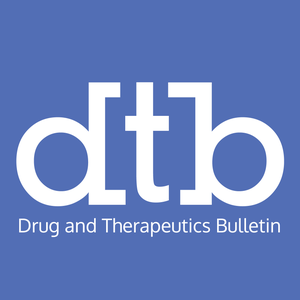
DTB podcast
BMJ Group
Drug and Therapeutics Bulletin Podcast
- 26 minutes 2 secondsMedicines and global warming, donanemab for AD, and cytisine for smoking cessationIn this podcast recorded in early April, James Cave (Editor-in-Chief) and David Phizackerley (Deputy Editor) talk about the May 2024 issue of DTB. They discuss the editorial that highlights the effect medicines have on greenhouse gas emissions and the need to consider the environmental impact of all aspects of the patient care pathway (https://dtb.bmj.com/content/62/5/66). They review the results of a study that assessed the effect of donanemab on early symptomatic Alzheimer's disease (https://dtb.bmj.com/content/62/5/67). The main article considers the evidence for cytisine, a nicotine receptor partial agonist, that has recently been licensed to facilitate quitting smoking (https://dtb.bmj.com/content/62/5/71). They begin by highlighting some useful resources relating to the safe use of valproate. Other links: https://www.england.nhs.uk/patient-safety/sodium-valproate/ https://www.england.nhs.uk/publication/decision-support-tool-is-valproate-the-right-epilepsy-treatment-for-me/ https://www.gov.uk/government/collections/valproate-safety-measures https://www.gov.uk/guidance/valproate-use-by-women-and-girls Please subscribe to the DTB podcast to get episodes automatically downloaded to your mobile device and computer. Also, please consider leaving us a review or a comment on the DTB Podcast iTunes podcast page (https://podcasts.apple.com/gb/podcast/dtb-podcast/id307773309). If you want to contact us please email [email protected]. Thank you for listening.25 April 2024, 3:41 pm
- 31 minutes 9 secondsDrug safety alerts, valproate safety (again) and a new contraceptive POP
In this podcast recorded in early March, James Cave (Editor-in-Chief) and David Phizackerley (Deputy Editor) talk about the April 2024 issue of DTB. They discuss the editorial that questions whether drug safety alerts are effective in changing practice and whether more needs to be done to implement safety recommendations (https://dtb.bmj.com/content/62/4/50). They review the Medicines and Healthcare products Regulatory Agency's latest risk minimisation measures for using valproate, which include a guide for healthcare professionals, a guide for patients, an annual risk acknowledgement form and an information card for patients (https://dtb.bmj.com/content/62/4/53). The main article considers the evidence for a new progestogen only pill containing drospirenone (https://dtb.bmj.com/content/62/4/55). They begin by discussing recent concerns over neuropsychiatric reactions associated with montelukast.
Please subscribe to the DTB podcast to get episodes automatically downloaded to your mobile device and computer. Also, please consider leaving us a review or a comment on the DTB Podcast iTunes podcast page (https://podcasts.apple.com/gb/podcast/dtb-podcast/id307773309). If you want to contact us please email [email protected]. Thank you for listening.26 March 2024, 10:11 am - 27 minutes 7 secondsProtecting consumers, tramadol-warfarin interaction and very low calorie dietsIn this podcast recorded in early February, James Cave (Editor-in-Chief) and David Phizackerley (Deputy Editor) talk about the March 2024 issue of DTB. They discuss the editorial highlighting the important work that the founders of The Medical Letter, Worst Pills, Best Pills and Drug and Therapeutics Bulletin did to scrutinise the safety of medicines and the need to challenge the processes by which medicines are licensed, appraised, commissioned and promoted (https://dtb.bmj.com/content/62/3/34). They review a coroner's Prevention of Future Deaths report that highlighted an interaction between tramadol and warfarin (https://dtb.bmj.com/content/62/3/36). They also talk about a study that compared the emergency contraceptive efficacy of levonorgestrel plus piroxicam with levonorgestrel plus placebo (https://dtb.bmj.com/content/62/3/38). The main article considers the effectiveness of low or very low calorie diets in achieving remission of type 2 diabetes (https://dtb.bmj.com/content/62/3/39). Link Mathew R. Prescribing isn’t a single act—getting it right requires time and effort. BMJ 2024;384:q279 (https://www.bmj.com/content/384/bmj.q279)
Please subscribe to the DTB podcast to get episodes automatically downloaded to your mobile device and computer. Also, please consider leaving us a review or a comment on the DTB Podcast iTunes podcast page (https://podcasts.apple.com/gb/podcast/dtb-podcast/id307773309). If you want to contact us please email [email protected]. Thank you for listening.28 February 2024, 5:00 am - 26 minutes 53 secondsADHD medicines shortages, fluoroquinolone safety, drugs not to prescribeIn this podcast recorded in early January, James Cave (Editor-in-Chief) and David Phizackerley (Deputy Editor) talk about the February 2024 issue of DTB. They discuss the editorial that highlights problems associated with shortages of ADHD medicines. They talk about two safety alerts issued by the Medicines and Healthcare products Regulatory Agency that focus on the adverse effects of fluoroquinolone antibiotics on physical and mental health. The main article considers various NHS initiatives that have attempted to limit primary care prescribing of drugs that are deemed to have limited clinical value. They begin the podcast with sad news of the death of Dr Sidney Wolfe (1937-2024), a colleague and friend who co-founded the US Health Research Group and Public Citizen (a nonprofit consumer advocacy organisation) and who was "a towering public health leader and an unparalleled consumer champion". Links
- Remembering Sid Wolfe: https://www.citizen.org/remembering-sidney-wolfe/
- Mandatory disclosure of all pharmaceutical and medical device companies’ payments to healthcare providers: learning from the US: https://dtb.bmj.com/content/60/4/52
- Worst Pills, Best Pills: https://www.citizen.org/topic/safe-affordable-drugs-devices/worst-pills-best-pills/
30 January 2024, 11:21 am - 17 minutes 17 secondsContinuity of care, statins and myasthenia gravis, and acne
In this podcast recorded in BMA House in December, James Cave (Editor-in-Chief) and David Phizackerley (Deputy Editor) talk about the January 2024 issue of DTB. They discuss continuity of care in general practice and the benefits it offers (https://dtb.bmj.com/content/62/1/2). They discuss a safety alert issued by the Medicines and Healthcare products Regulatory Agency that highlights a very small number of reports of new-onset or aggravation of pre-existing myasthenia gravis associated with statins (https://dtb.bmj.com/content/62/1/4). The main article is an overview of the management of acne (https://dtb.bmj.com/content/62/1/6). They begin the podcast by providing a brief update on the results of a trial that assessed the effect of semaglutide on cardiovascular outcomes in people aged ≥45 years with cardiovascular disease (but not diabetes) and a BMI ≥27 kg/m2 (plot spoiler: make sure you know your ARRs from your RRRs).
Please subscribe to the DTB podcast to get episodes automatically downloaded to your mobile device and computer. Also, please consider leaving us a review or a comment on the DTB Podcast iTunes podcast page (https://podcasts.apple.com/gb/podcast/dtb-podcast/id307773309). If you want to contact us please email [email protected]. Thank you for listening.
28 December 2023, 12:59 pm - 26 minutes 40 secondsRationalising blood tests, bempedoic acid and CV outcomes and semaglutide for obesityIn this podcast, James Cave (Editor-in-Chief) and David Phizackerley (Deputy Editor) talk about the December 2023 issue of DTB. They discuss monitoring drugs in primary care and the need to rationalise the number of blood tests undertaken (https://dtb.bmj.com/content/61/12/178). They talk about a study that reported the effect of bempedoic acid on a composite cardiovascular outcome (https://dtb.bmj.com/content/61/12/180). The main article is a review of semaglutide as an option for weight management and discusses the evidence for its use and some of the hype that has surrounded the its launch (https://dtb.bmj.com/content/61/12/182). They begin by responding to a listener's complaint about terminology. Related link: Aronson JK. When I use a word . . . Medicines regulation—apothecaries, quacks, chemists, druggists, pharmacists. BMJ 2023;383:p2603. https://www.bmj.com/content/383/bmj.p2603 Please subscribe to the DTB podcast to get episodes automatically downloaded to your mobile device and computer. Also, please consider leaving us a review or a comment on the DTB Podcast iTunes podcast page (https://podcasts.apple.com/gb/podcast/dtb-podcast/id307773309). If you want to contact us please email [email protected]. Thank you for listening.30 November 2023, 10:23 am
- 20 minutes 5 secondsBNF moving with the times; preventable deaths; plus an intro to pharmacogeneticsIn this podcast, James Cave (Editor-in-Chief) and David Phizackerley (Deputy Editor) talk about the November 2023 issue of DTB. They discuss the history of the BNF and the announcement that the 86th edition of the BNF and the 2023–2024 edition of the BNF for Children will be the last print issues to be purchased by the National Institute for Health and Care Excellence for the NHS in England (https://dtb.bmj.com/content/61/11/162 and https://dtb.bmj.com/content/61/11/166). They talk about a retrospective review of a case series of UK coroners’ Reports to Prevent Future Deaths that found that around one in five reports involved a medicine (https://dtb.bmj.com/content/61/11/165). The main article provides an introduction to pharmacogenetics (https://dtb.bmj.com/content/61/11/168). They begin by responding to a listener's email. Please subscribe to the DTB podcast to get episodes automatically downloaded to your mobile device and computer. Also, please consider leaving us a review or a comment on the DTB Podcast iTunes podcast page (https://podcasts.apple.com/gb/podcast/dtb-podcast/id307773309). If you want to contact us please email [email protected]. Thank you for listening.25 October 2023, 11:33 am
- 16 minutes 48 secondsTaxing ill health, and what evidence for intravenous vitamins?In this podcast, James Cave (Editor-in-Chief) and David Phizackerley (Deputy Editor) talk about the October 2023 issue of DTB. They discuss NHS prescription charges in England and the impact they have on people with long-term ill health (https://dtb.bmj.com/content/61/10/146). They talk about a study that assessed the incidence of retinopathy associated with hydroxychloroquine (https://dtb.bmj.com/content/61/10/148). The main article discusses intravenous vitamins and reviews the evidence for their use for serious medical conditions and the evidence for their use in the absence of a specific vitamin deficiency or medical condition (https://dtb.bmj.com/content/61/10/151). The latest issue of Australian Prescriber mentioned in thia podcast is available from https://australianprescriber.tg.org.au/. Please subscribe to the DTB podcast to get episodes automatically downloaded to your mobile device and computer. Also, please consider leaving us a review or a comment on the DTB Podcast iTunes podcast page (https://podcasts.apple.com/gb/podcast/dtb-podcast/id307773309). If you want to contact us please email [email protected]. Thank you for listening.27 September 2023, 11:12 am
- 28 minutes 23 secondsNICE and redacted data, spironolactone for acne, and drugs with anticholinergic activity
In this podcast, James Cave (Editor-in-Chief) and David Phizackerley (Deputy Editor) talk about the September 2023 issue of DTB. They discuss concerns over redacted data in NICE appraisal documents (https://dtb.bmj.com/content/61/9/130). They review a placebo-controlled study that assessed the use of spironolactone for women with acne (https://dtb.bmj.com/content/61/9/132). The main article explores anticholinergic burden and the risk of cognitive decline, dementia and increased mortality associated with long-term use of drugs with anticholinergic activity (https://dtb.bmj.com/content/61/9/135).
Please subscribe to the DTB podcast to get episodes automatically downloaded to your mobile device and computer. Also, please consider leaving us a review or a comment on the DTB Podcast iTunes podcast page (https://podcasts.apple.com/gb/podcast/dtb-podcast/id307773309). If you want to contact us please email [email protected]. Thank you for listening.
30 August 2023, 12:09 pm - 24 minutes 42 secondsFeNO and asthma, low-dose aspirin and H pylori eradication, plus finerenone
In this podcast, James Cave (Editor-in-Chief) and David Phizackerley (Deputy Editor) talk about the August 2023 issue of DTB. They discuss measurement of fractional exhaled nitric oxide (FeNO) in the management of asthma (https://dtb.bmj.com/content/61/8/114). They review a study that assessed the use of H. pylori eradication in people taking low-dose aspirin (https://dtb.bmj.com/content/61/8/116). The main article explores the evidence for the use of finerenone for CKD associated with type 2 diabetes (https://dtb.bmj.com/content/61/8/120).
Please subscribe to the DTB podcast to get episodes automatically downloaded to your mobile device and computer. Also, please consider leaving us a review or a comment on the DTB Podcast iTunes podcast page (https://podcasts.apple.com/gb/podcast/dtb-podcast/id307773309). If you want to contact us please email [email protected]. Thank you for listening.
26 July 2023, 11:59 am - 26 minutes 58 secondsJuly 2023: Whither evidence, COI in guidelines, isotretinoin safety, SGLT2 inhibitors and Utrogestan shortage
In this podcast, James Cave (Editor-in-Chief) and David Phizackerley (Deputy Editor) talk about the July 2023 issue of DTB. They discuss evidence-based medicine, access to evidence and increasing use of press releases and social media to present evidence (https://dtb.bmj.com/content/61/7/98). They talk about the safety of isotretinoin (https://dtb.bmj.com/content/61/7/99) and review a study that assessed the accuracy of conflict of interest statements in clinical guidelines (https://dtb.bmj.com/content/61/7/100). The main review article explores the evidence for cardiac and renal effects of SGLT2 inhibitors (https://dtb.bmj.com/content/61/7/103). They begin by discussing the impact of the shortage of Utrogestan.
28 June 2023, 4:25 pm - More Episodes? Get the App
Your feedback is valuable to us. Should you encounter any bugs, glitches, lack of functionality or other problems, please email us on [email protected] or join Moon.FM Telegram Group where you can talk directly to the dev team who are happy to answer any queries.
 The General Practice Podcast
The General Practice Podcast
 BMJ Best Practice Podcast
BMJ Best Practice Podcast
 eGPlearning Podblast
eGPlearning Podblast
 NICE Talks
NICE Talks
 RCGP CIRC Podcast
RCGP CIRC Podcast
 SAGE General Practice
SAGE General Practice